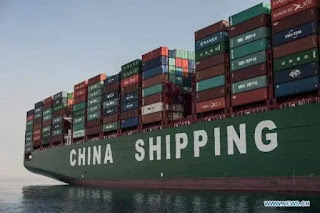China’s trade surplus with the United States ballooned to a record $34.1 billion in September, despite a raft of US tariffs, official data showed Friday, adding fuel to the fire of a worsening trade war.
Relations between the world’s two largest economies have soured sharply this year, with US President Donald Trump vowing on Thursday to inflict economic pain on China if it does not blink.
The two countries imposed new tariffs on a massive amount of each other’s goods mid-September, with the US targeting $200 billion in Chinese imports and Beijing firing back at $60 billion worth of US goods.
“China-US trade friction has caused trouble and pounded our foreign trade development,” customs spokesman Li Kuiwen told reporters Friday.
But China’s trade surplus with the US grew 10 percent in September from a record $31 billion in August, according to China’s customs administration. It was a 22 percent jump from the same month last year.
China’s exports to the US rose to $46.7 billion while imports slumped to $12.6 billion.
China’s overall trade — what it buys and sells with all countries including the US — logged a $31.7 billion surplus, as exports rose faster than imports.
Exports jumped 14.5 percent for September on-year, beating forecasts from analysts polled by Bloomberg News, while imports rose 14.3 percent on-year.
While the data showed China’s trade remained strong for the month, analysts forecast the trade war will start to hurt in coming months.
China’s export jump for the month suggests exporters were shipping goods early to beat the latest tariffs, said ANZ’s China economist Betty Wang, citing the bounce in electrical machinery exports, much of which faced the looming duties.
“We will watch for downside risks to China’s exports” in the fourth quarter, Wang said.
Analysts say a sharp depreciation of the yuan has also helped China weather the tariffs by making its exports cheaper.
“The big picture is the Chinese exports have so far held up well in the face of escalating trade tensions and cooling global growth, most likely thanks to the competitiveness boost provided by a weaker renminbi (yuan),” said Julian Evans-Pritchard, China economist at Capital Economics.
“With global growth likely to cool further in the coming quarters and US tariffs set to become more punishing, the recent resilience of exports is unlikely to be sustained,” he said.
– China-US relations –
Trump accused China of thinking Americans are “stupid” and boasted that his tariffs had already “had a big impact” on China’s stumbling economy in a Thursday interview on Fox News.
“I have a lot more to do if I want to do it. I don’t want to do it but they have to come to the table,” he warned.
The yuan has fallen for weeks against the US dollar, dropping nine percent in the past six months, which mitigates the rise in the price of Chinese goods caused by punitive US tariffs.
US Treasury Secretary Steven Mnuchin — in comments published in the Financial Times this week — warned China against engaging in competitive currency devaluations.
China has steadfastly denied that it has manipulated the yuan to cope with the tariffs. The US dollar has strengthened against a range of currencies this year as American interest rates have risen.
China’s stock market has plunged this year but the trade war has also started to erode Trump’s oft-touted US stock gains, with the Dow Jones Industrial Average down more than five percent for the week.
The International Monetary Fund this week cited the trade war as it lowered its 2019 growth forecast for China, which is set to see its slowest expansion since 1990.
The IMF also lowered estimates for the United States and the global economy
